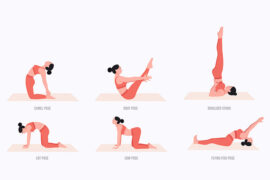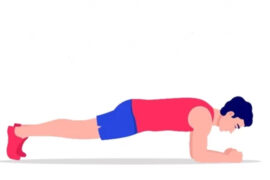Workout routines are tailored based on several factors, such as the specific body parts being targeted, the type of exercises being performed, and the individual’s overall health condition. These elements help determine the most effective exercises and intensity levels for achieving fitness goals while ensuring safety and maximizing results.
World Health Organization’s Recommendations:
- Moderate-Intensity Physical Activity: At least 150 minutes per week (approximately 30 minutes per day, 5 days a week) is enough to maintain good health.
- Vigorous-Intensity Physical Activity: 25–30 minutes daily of vigorous activity can provide similar benefits, delivering moderate to substantial health improvements.
Expert Recommendations on Daily Exercise Duration:
- Ideal Duration for General Fitness: 30 to 45 minutes of moderate-intensity exercise daily is typically sufficient for most people to maintain fitness and support heart health.
- For Weight Loss or Endurance Goals: 60 minutes of daily exercise is recommended if your goal is weight loss or building endurance.
- Shorter Sessions for Busy Days: On days when time is limited, 25 minutes of high-intensity workouts can still be effective for stress reduction and maintaining overall well-being.
- Consistency: Consistency in daily activity is critical for long-term success. It’s important to stay active each day, whether through walking, cycling, yoga, or strength training. Variety is key to preventing monotony. Incorporating both cardiovascular exercises (like aerobics) and strength training will help improve your overall fitness.
Combining Cardio and Strength Training:
- A 60-minute session that combines cardio and strength training can help burn more calories and improve overall fitness.
- Twice a week of such combined workouts is enough to maintain general well-being.
- Alternating cardio and strength training days with rest/recovery days in between is a great way to keep your routine balanced and sustainable.
For Individuals with Health Conditions:
- Those with underlying health conditions like cardiovascular disorders or diabetes should consider shorter exercise sessions and tailor their workouts to suit their specific needs.
- Consult a medical professional before starting any new fitness regimen to ensure safety and effectiveness.
Structured Workout Plans:
- A structured routine targeting different muscle groups on separate days is proven to be more effective.
- For example: Cardio on one day, Strength training the next, Followed by a rest/recovery day.
- Rest days are essential for muscle recovery and injury prevention.
Key Takeaways:
- Duration: 25–30 minutes of exercise is usually enough to reap health benefits. Combining cardio and strength training can extend your workout to 60 minutes for even more benefits.
- Variety and Consistency: A mix of different exercises and staying consistent is critical for achieving long-term fitness results.
- Recovery: Rest and recovery days are just as important as active days to prevent overtraining and injury.
Final Advice:
- Any physical movement is better than none! It’s important to stay active throughout the day, especially if you have a sedentary job. Try incorporating stretching breaks or short walks during work hours to stay mobile.
- Consulting a fitness expert can help you design a workout plan that aligns with your personal goals and health conditions.
Would you like me to help you create a customized weekly workout plan based on your fitness goals or a specific time constraint? Let me know how I can assist you further!
Disclaimer:
The information contained in this article is for educational and informational purposes only and is not intended as a health advice. We would ask you to consult a qualified professional or medical expert to gain additional knowledge before you choose to consume any product or perform any exercise.







